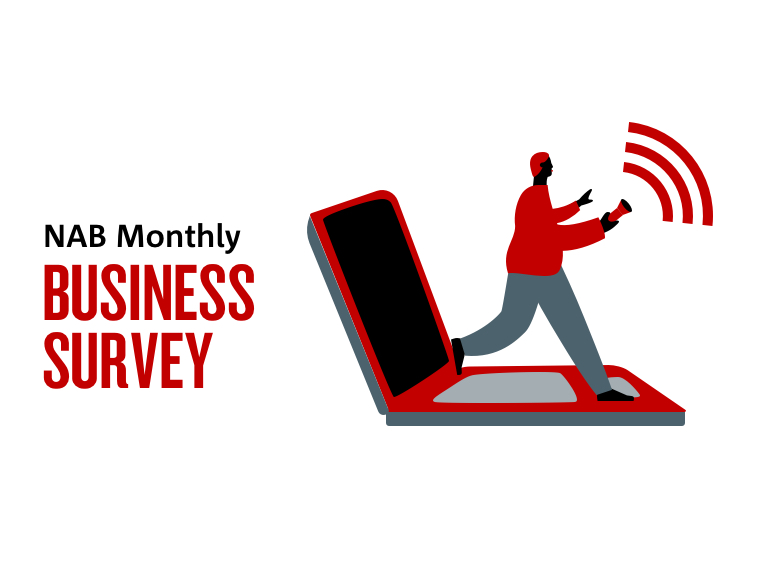Sally Auld, NAB Group Chief Economist, shares her insights on the economy


Webinar
Activity, employment strengthen as prices push higher.

Our podcast series to accompany the NAB Monthly Business Survey continues, giving you a 10 minute summary of the key survey developments this month. Listen now.
If listening on a mobile device, click listen in browser.
Business conditions and confidence strengthened in February as the Omicron virus wave eased and the late 2021 momentum was regained. After a fall in January, the conditions index rebounded to be above its long-run average. The rebound came on the back of a strong rise in the employment index – reflecting fewer health-related employment disruptions and strong labour demand – as well as improvements in trading and profitability. Almost all mainland states and industries shared in the upswing, but WA saw conditions fall as the planned border reopening was postponed. There was also a broad-based improvement in confidence, again with the exception of WA and Tasmania, and forward indicators rose. Businesses continued to report elevated costs growth, although purchase cost growth eased slightly from the record levels reached in January. Final product price inflation also remained elevated with retail prices strengthening to over 2% in quarterly terms, suggesting that cost pressures are increasingly being passed on to consumers. Still, prices continue to be driven more by temporary purchase cost factors rather than more sustained wage and labour cost pressures. How these forces evolve over the coming months remains a key uncertainty, with wages growth likely to strengthen as purchase costs ease.
Business conditions rose 7pts in February, to +9 index points, to be back above their long-run average. The result was driven by a sharp rise in the employment index which rose 9pts to +8 index points. Trading conditions (up 2pts to +10) and profitability (up 3pts to +5) also rose.
“After Omicron caused significant disruption to businesses in January, the latest survey results show things were getting back on track,” said NAB Group Chief Economist Alan Oster. “The employment index has improved considerably as the labour market strengthens, after the virus caused many to be unable to work due to illness or isolation requirements at the peak of the recent wave.”
“Business conditions rebounded strongly in Victoria and NSW, although WA and Tasmania saw conditions slip,” said Mr Oster. “In terms of industries, conditions really improved across the board with big gains in retail and transport & utilities. Recreation & personal services also improved, though it continues to trail the pack.”
Business confidence rose 8pts in February to +13 index points, building on a strong rise in January after a sharp fall in December. Confidence rose across all industries and most states, but fell in WA and Tasmania.
“Confidence continued to improve in February as the threat to the economy from the Omicron outbreak receded,” said Mr Oster. “That said, the survey for the month was largely completed before the invasion of Ukraine, so we will have to wait to see how big the impact of the conflict will be on confidence.”
Forward orders improved 4pts to +9 index points, and capex also strengthened 5pts to +8 index points. Capacity utilisation edged higher, from 81.7% to 82.5%, largely driven by retail.
Purchase cost growth came in at 2.7% in quarterly terms. Labour cost growth and final product price growth were both steady but remain elevated. Retail price inflation strengthened to 2.1% in quarterly terms, back to the highs seen at the end of 2021.
“Purchase costs growth eased a little in February but remains at historically high levels, reflecting ongoing supply chain challenges – and these issues may be further compounded by events in Ukraine and sanctions against Russia,” said Mr Oster.
“Retail price growth strengthened in February, now above 2% in quarterly terms, suggesting that businesses are passing higher costs through to consumers,” said Mr Oster. “While survey price measures differ from official measures in important ways, the results suggest another quarter of strong inflation is likely when March quarter CPI is released next month,” said Mr Oster.
“Overall, the February survey shows that the economy is quickly getting back on track as the Omicron wave recedes,” said Mr Oster. “The outlook is fairly strong with supply disruptions and cost pressures now the major challenge facing businesses.”
For more information, please see the NAB Monthly Business Survey (February 2022)
© National Australia Bank Limited. ABN 12 004 044 937 AFSL and Australian Credit Licence 230686.